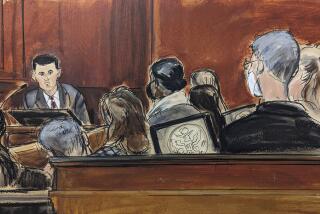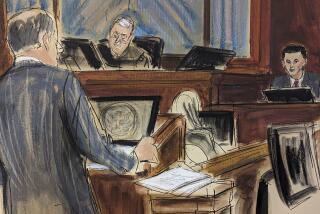TCW chairman testifies bond fund manager was ‘unstable’ but valuable
- Share via
TCW Group Inc. Chairman Robert Day testified that the firm’s star bond fund manager had become “unstable” in the months leading up to the decision to fire him, but that the company still had hoped to strike a deal to keep him.
Jurors in the bitter court battle between TCW and its former chief investment officer, Jeffrey Gundlach, on Wednesday also heard the L.A. money management firm’s former president call Gundlach “a disease” on the company and “the most” arrogant money manager he had ever met.
Bill Sonneborn, who quit as president of TCW in 2008, testified that he advised TCW Chief Executive Marc Stern in August 2009 to oust Gundlach, but that Stern “said he couldn’t do it. He said Jeffrey had become too important” to TCW.
Gundlach has racked up a stellar record investing in mortgage-backed securities, making him one of the world’s best-known bond fund managers. Wall Street was stunned in December 2009 when TCW abruptly fired him. One month later TCW sued Gundlach, alleging that he and key aides conspired to abandon the firm and stole massive amounts of TCW proprietary data that they used to quickly set up a rival firm.
Gundlach, 51, countersued, accusing TCW of firing him after 24 years at the firm to cheat him out of a huge chunk of promised income. He denies using any TCW data to create his new firm, DoubleLine Capital, which has attracted $15 billion in assets from investors.
Each side is seeking hundreds of millions of dollars in damages from the other. The civil trial is taking place in L.A. County Superior Court.
Sonneborn, now head of asset manager KKR Financial Holdings in San Francisco, was the last witness called by TCW in its side of the case. His testimony backed previous testimony by Stern, 66, who has said he wanted to keep Gundlach but believed that the fund manager was plotting to leave the firm in the lurch.
Gundlach’s attorneys have in turn sought to show that TCW was working on a plan to oust him in summer 2009.
Jurors on Wednesday saw a video deposition given by the 67-year-old Day, who founded TCW in 1971. Under questioning by Gundlach’s attorneys, Day testified that he knew Gundlach wasn’t happy about Day’s choice to bring Stern back as head of the firm in June 2009. “I think he thought he should be CEO,” Day said.
Day testified that Stern wanted to work out “something [Gundlach would] be happy with.” But that was “very difficult when someone’s being that unstable,” Day said.
Asked by Gundlach’s attorneys whether he could name “a single thing” that was done to reach a deal with the fund manager, Day said: “I just don’t remember.”
He also said he didn’t conclude that Gundlach was unfit to be managing clients’ funds for TCW in the summer of 2009, despite “unstable” behavior.
“He was unstable but he had a tremendous track record,” Day said.
The jury also heard testimony about help that Gundlach received in setting up DoubleLine Capital from Oaktree Capital Management, which bought a 22% stake in DoubleLine when the firm was formed in December 2009.
Paul Deitch, an Oaktree executive who as in charge of assisting DoubleLine, said under questioning by Gundlach’s attorneys that DoubleLine got a head start because Oaktree provided much of the infrastructure the new firm needed. He also said he wasn’t aware of any proprietary TCW data in DoubleLine’s possession.
But under cross-examination by TCW’s attorneys, Deitch said he wasn’t involved in the work that DoubleLine’s own employees were doing in setting up the firm’s investment database, so he couldn’t say that no TCW information was being used.
The trial is expected to continue into next week.
More to Read
Inside the business of entertainment
The Wide Shot brings you news, analysis and insights on everything from streaming wars to production — and what it all means for the future.
You may occasionally receive promotional content from the Los Angeles Times.









